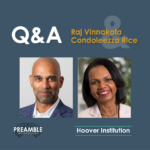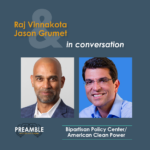Preamble: Roslyn Clark Artis & Jonathan Holloway
March 6, 2023
Share
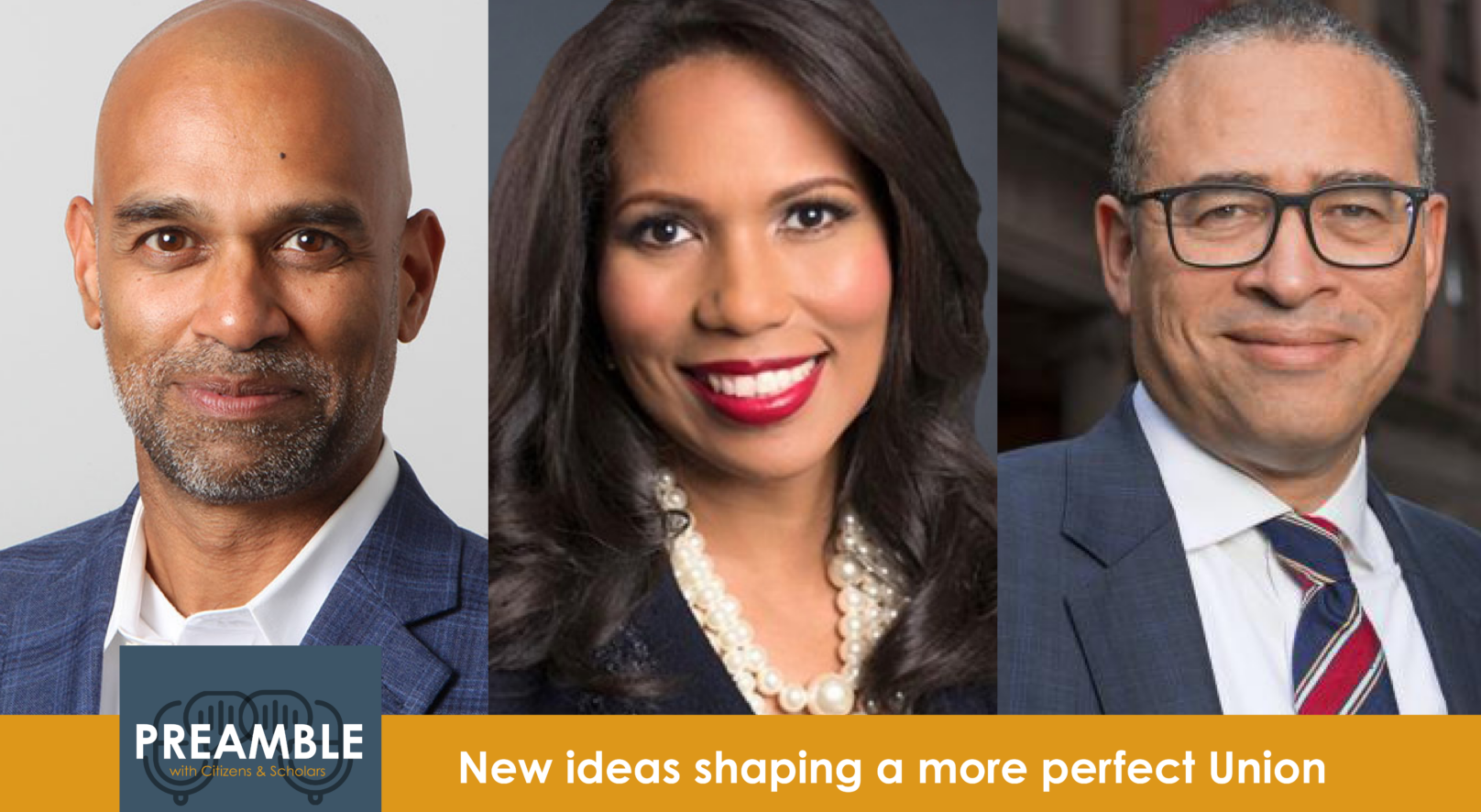
In this urgent moment for the nation, we can strengthen democracy—together. In Preamble, Citizens & Scholars president Raj Vinnakota sits down for 15-minute conversations with diverse thought leaders—across traditional divides—on the new ideas shaping a more perfect Union.
Here, Raj sits down with two college presidents: Roslyn Clark Artis, President of Benedict College in South Carolina, and Jonathan Holloway, President of Rutgers University in New Jersey. Below is an edited excerpt from the conversation.
Raj Vinnakota: I’d be interested in just starting with you Rosalyn, what do you do on campus that focuses on citizen development?
Roslyn Clark Artis: The events of the last several years really have galvanized the campus in a unique way. My students are deeply engaged in ways that perhaps they had not been previously.
Both COVID-19 and the racial reckoning really triggered some new energy on the campus, a willingness on the part of students to engage, to have conversations not just with other students but with their faculty and with me and other members of the administration about what they’d like to see in the world that they’re trying to develop.
We talk about being powers for good in society and I think our students feel a sense of empowerment in this moment. And so they are collaborating, they are mobilizing, whether it relates to voter empowerment and outreach or whether it is just advocacy. I’m seeing a real renaissance of student engagement. I’m really excited about that.
RV: Is that energy driven largely from the student body?
Roslyn Clark Artis: It is. I would like to say I’m responsible for it singularly and solely, but that is not the case. It really is student self-efficacy at its best.
I think we have planted some seeds of self-agency and talked to them about how important their voices are in this moment. But they have really taken the bull by the horns and are self-organizing and seeking resources. There’s been a coalescing around campus values that has been student driven.
RV: How about you, Jonathan, at Rutgers? How does citizen development take a central role?
Jonathan Holloway: Because we’re so big and diffuse, I’m always talking about how we organize a community within ourselves. From the very beginning of my presidency, I’ve talked about the importance of aspiring to become a beloved community and what it means to do that. And if you’re going to do that, that means being a good civic actor. And so, while there’s a lot of the same kind of activism on our campuses as Roslyn mentioned, I didn’t start those students’ actions. There are plenty of other things stimulating them in that regard.
I think one of the roles that presidents play is being the cultural markers for the institution. And for me it’s important to be absolutely consistent on this issue of citizen development. That’s one way I’m contributing to the conversations on campus. I’m also starting a few things that are about trying to underscore the importance of civic engagement by students. We’re starting at a small scale, given that we have 50,000 students total, but we’re getting off to a decent start in those places too.
From the Conversation: Beloved Community
President Artis and President Holloway discuss the ways they foster a beloved community on their campuses at Rutgers University and Benedict College.
RV: One of the ways that you seem to be expanding it is to think about this beyond just voting. Can you talk a little bit about how you think about it in a more expansive way?
Jonathan Holloway: Sure. I mean, service can happen at every different level of society. It’s really about giving a darn about your neighbor.
A lot of students imagine that they’ve got to intern in an elected official’s office. That’s the pretty standard path toward being involved. We started a program that’s about civic service. And it could turn into an internship in an elected official’s office, but it could also be an internship in the local Boys and Girls Club. It could be an internship in a homeless shelter. Traditionally you don’t get paid internships for these things, so we’re flipping it. And we will pay the students to be good civic actors.
Also, going back to this beloved community idea: a university is not just the faculty or the students. It’s the people who wear uniforms and whose names we often d,on’t know. Who, without their work in two days, the whole place shuts down. And I’ve been out front from the beginning of that talking about we are all in this together. And it’s important you recognize it.
I think that’s being civically minded too, frankly. Getting out the vote, all for it. Registering, all for it. All the traditional forms of articulating participation in democracy, all for it. But I also believe that being a good neighbor makes a big difference and people should understand that that is being civically minded too.
All the traditional forms of articulating participation in democracy, all for it. But I also believe that being a good neighbor makes a big difference and people should understand that that is being civically minded too.
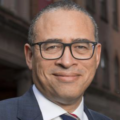
RV: How do you take this amazing energy and activism and engagement and start to work with your students to think more broadly about civic preparedness and engagement?
Roslyn Clark Artis: We have an extensive service-learning requirement at the institution. And our students tend to be very engaged with things beyond themselves, bigger than themselves. It’s the connective tissue, if you will, that engages our institution.
We also really try to stimulate them with co-curricular experiences, extracurricular experiences that are designed specifically to expose them to people that they might not normally engage with. I learn tremendous things from students. Their perception of reality from their vantage point with the constant feed that they’re receiving from social media really helps me to understand why they think the way they do. We’re trying to double down on those moments to connect the dots for students and to help them to be thoughtful consumers of the massive amounts of information that presses down on them all of the time.
Students are inclined to speak in sound bites. So we have to ask: What do you base that on? Where did you read that or hear that? Is it a person that you know or value? Is that your closely held opinion or is that something you saw or heard? And so really helping students unpack the sources and uses of information and be thoughtful about how they share and how they distribute that across our community is important.
And also being mindful. We’ve heard a lot about mindfulness over these last couple of years, and it is a habit of mind. It is a practice that we spend a great deal of time delving into on Benedict’s campus because we are the sum of our parts. And if everyone is not functioning together, if there is a broken link in our chain, we all get lost.
From the Conversation: Higher Education & Democracy
Raj asks President Artis and President Holloway on what they feel the role of higher education in strengthening democracy:
“Higher education serves as a bulwark to protect democracy. We are one of the last lines to protect it and to enhance it”
-Rutgers University President, Jonathan Holloway
RV: Going beyond our individual campuses, what do you think is the role of higher education in strengthening our democracy?
Roslyn Clark Artis: I think the words public good have been sensationalized in an unusual way, weaponized in some ways. At its essence, that is exactly what education is designed to do. It helps to solidify ideas and notions. It’s to foster creativity and critical thinking and engagement and collaboration.
And I think if we let go of that, I think many of us talk in terms of vocations and getting a job and economic development and all those sorts of things because there’s some pressure on us all to speak that language. But in doing so, we have cost ourselves something. We have ceded the moral high ground on what education was designed to do.
We cannot cede that if we’re going to do a good job.
Jonathan Holloway: At last year’s commencement, I told the graduating students about the importance of being an educated citizen. It’s not that radical of an idea, but I talked about it in terms of the role that higher education serves as a bulwark to protect democracy. We are one of the last lines to protect it and to enhance it.
A couple weeks later, I was sent a couple of presidential inbox emails from people complaining that I politicized commencement. I’m like, if I’m politicizing commencement saying higher education is there to protect democracy, then I will be politicizing commencement. Because we can’t cede that ground. We can’t.
The alternative of giving that up is not a place we want to be. Scientific discovery collapses, moral centeredness collapses, economic engines collapse. I mean, you just keep on going down the line.
Think of HBCUs, public universities, small liberal arts colleges, all these types of schools that are not the fancy elite privates. We are educating a mountain of people and we are laying the groundwork for their future improvements, their family’s future improvements, and we’re laying the foundation for their preservation of an idea, which is the democratic ideal. I can’t give that up.
“Education helps to solidify ideas and notions. It’s to foster creativity and critical thinking and engagement and collaboration. And I think if we let go of that…we have cost ourselves something. We have ceded the moral high ground on what education was designed to do. “
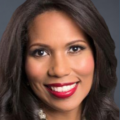
Stay Engaged
Get More News
Join our mailing list to get more news like this to your mailbox.
Support Our Work
Help us invest in the talent, ideas, and networks that will develop young people as effective, lifelong citizens.
Ways to Support Us